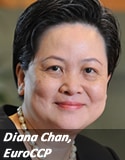Two of Europe’s largest cash equity clearing houses today announced they will merge to offer market participants netting and reduced collateral obligations mandated by new regulation.
EuroCCP and European Multilateral Clearing Facility (EMCF) will form a new entity named EuroCCP. It will use the risk management framework of EuroCCP and the technology and operating infrastructure of EMCF.
Combined, the central counterparty (CCP) will clear cash equity trades for Europe’s largest multilateral trading facilities (MTFs) including BATS Chi-X Europe, Sigma X MTF, London Stock Exchange-owned Turquoise, UBS MTF, Burgundy and Equiduct, in addition to Nasdaq OMX Nordic venues.
Clients of the CCP will be eligible for greater netting and reduced inter-CCP settlements in addition to less collateral obligations through portfolio margining. Also, a single guarantee fund and membership fee will further lower costs.
 “The new CCP will lead the way in encouraging greater competition between all cash equity clearing houses while driving down costs,” Diana Chan, CEO of EuroCCP, who will retain her post in the new entity. “Following the launch of four-way interoperability, the industry must now consolidate in Europe to achieve economies of scale and respond to the changing needs of market participants. Combining our organisations will accomplish this.”
“The new CCP will lead the way in encouraging greater competition between all cash equity clearing houses while driving down costs,” Diana Chan, CEO of EuroCCP, who will retain her post in the new entity. “Following the launch of four-way interoperability, the industry must now consolidate in Europe to achieve economies of scale and respond to the changing needs of market participants. Combining our organisations will accomplish this.”
Ownership of the new entity will be split into four equal shares, held by the Depository Trust & Clearing Corporation (DTCC), ABN AMRO, Nasdaq OMX and BATS Chi-X Europe. This effectively means the DTCC – which owns EuroCCP – will relinquish a significant stake as BATS Chi-X Europe buys into the new clearer. Nasdaq OMX will also increase its overall position, from 22% of EMCF, to 25% of the new entity. The equal split of the new entity is designed to spread risk and control of the CCP.
This is the first major CCP consolidation linked to new post-trade rules governing CCPs in the European markets infrastructure regulation (EMIR), which require clearing houses to hold greater collateral to mitigate counterparty risk.
The merger also brings the debate on interoperability between primary exchanges and CCPs into sharper focus. Chan has been an outspoken supporter of interoperability, which is not currently mandated by European regulation. EuroCCP was one of four CCPs that introduced interoperability for a select number of European MTFs in 2010 alongside SIX Swiss Exchange-owned SIX x-clear and Anglo-French CCP LCH.Clearnet.
Speaking to theTRADEnews.com about EMIR guidelines composed by the European Securities and Markets Authority in January, Chan said the rules would not spur exchanges to open up clearing to CCPs outside of their corporate structures.
“The ESMA guidelines’ aim is to ensure interoperability among CCPs is safe and they should therefore give comfort to exchanges that are genuinely concerned about interoperability introducing new risks. However, if commercial reasons are behind an exchange’s reluctance to give access to interoperating CCPs, the guidelines are unlikely to change that,” Chan said.